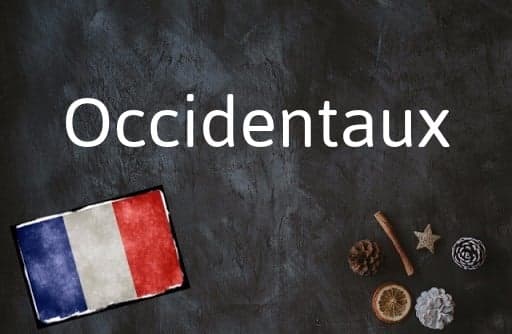French Word of the Day: Occidentaux

This has an ancient word root but an all-too-modern application.
Why do I need to know Occidentaux?
Because it features regularly in newspapers and news programmes at the moment.
What does it mean?
Occidentaux – pronounced ock-si-dont-oh – is the masculine plural form of the adjective occidental, meaning western.
It's used in a lot of contexts to mean the western part of something, but it also has a political context.
So in discussions about the Russian invasion of Ukraine, you might hear phrases such as pays occidentaux, meaning western countries; gouvernements occidentaux - western governments; or états occidentaux - western states.
It's frequently used on its own too, especially in headlines such as 'Le Président Zelensky accuse les Occidentaux . . .' - President Zelensky accuses the west.
It is sometimes used to describe those nations that are signatories to the North Atlantic Treaty - particularly at the moment - in fact, that’s the Larousse Dictionary definition of the word.
It derives from the Latin occidens, (sunset, West), in contrast to the Orient (oriens, rise, East). While 'the orient' exists in English it's pretty archaic, whereas in France Moyen orient means the Middle East.
Use it like this
Pays occidentaux - western countries
La partie occidentale du pays est couverte de forêts - The western part of the country is covered by forests.
Alternatives
L'ouest - the west
L'est - the east
These are the more straightforward phrases for east and west but they tend to be used for either compass points or specific regional descriptions eg la sud-ouest de la france.
They're not used for wider or geopolitical descriptions, so you won't hear politicians talking about La réponse de Moucou aux ouest - Moscow's response to the west.
Comments
See Also
Why do I need to know Occidentaux?
Because it features regularly in newspapers and news programmes at the moment.
What does it mean?
Occidentaux – pronounced ock-si-dont-oh – is the masculine plural form of the adjective occidental, meaning western.
It's used in a lot of contexts to mean the western part of something, but it also has a political context.
So in discussions about the Russian invasion of Ukraine, you might hear phrases such as pays occidentaux, meaning western countries; gouvernements occidentaux - western governments; or états occidentaux - western states.
It's frequently used on its own too, especially in headlines such as 'Le Président Zelensky accuse les Occidentaux . . .' - President Zelensky accuses the west.
It is sometimes used to describe those nations that are signatories to the North Atlantic Treaty - particularly at the moment - in fact, that’s the Larousse Dictionary definition of the word.
It derives from the Latin occidens, (sunset, West), in contrast to the Orient (oriens, rise, East). While 'the orient' exists in English it's pretty archaic, whereas in France Moyen orient means the Middle East.
Use it like this
Pays occidentaux - western countries
La partie occidentale du pays est couverte de forêts - The western part of the country is covered by forests.
Alternatives
L'ouest - the west
L'est - the east
These are the more straightforward phrases for east and west but they tend to be used for either compass points or specific regional descriptions eg la sud-ouest de la france.
They're not used for wider or geopolitical descriptions, so you won't hear politicians talking about La réponse de Moucou aux ouest - Moscow's response to the west.
Join the conversation in our comments section below. Share your own views and experience and if you have a question or suggestion for our journalists then email us at [email protected].
Please keep comments civil, constructive and on topic – and make sure to read our terms of use before getting involved.
Please log in here to leave a comment.